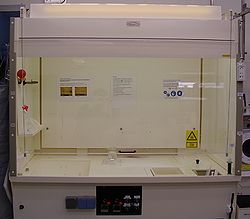Specific Process Knowledge/Etch/Wet Titanium Etch
Feedback to this page: click here
Ething of Titanium can be done either wet or dry. For wet etching please see below on this page. Dry etching can be done either with ICP using Chlorine chemistry or with IBE by sputtering with Ar ions.
Wet etching of Titanium

Wet etching of titanium can be done in the "HF5%/BHF-dirty" bath in this fume hood

Wet etching of titanium can also be done in beakers with BHF or RCA1 mix in a beaker in one of these fume hoods
We have two solutions for wet titanium etching:
- BHF (wetbench or fumehood)
- Cold RCA1 (fumehood)
Etching titanium in BHF can take place in the 'HF5%/BHF-dirty' bath inside Fumehood(RCA) in cleanroom B-1. This is the only pre-made BHF bath where metals are allowed. You can also do the titanium etch in BHF or RCA1 mix by making your own solution in a beaker in Fumehood 01 or 02 in cleanroom D-3. You can see the APV here.
Comparing the two solutions
| BHF | Cold RCA1 | |
|---|---|---|
| General description | Etch of titanium with or without photoresist mask. | Etch of titanium (as stripper or with eagle resist). |
| Link to safety APV and KBA | see APV here | see APV here |
| Chemical solution | HF:NH4F | NH3OH:H2O2:H2O - 1:1:5 |
| Process temperature | Room temperature | Room temperature |
| Possible masking materials |
Photoresist (1.5 µm AZ5214E) |
Eagle resist |
| Etch rate |
Not known (it bubbles while etching) |
Not known |
| Batch size |
1-5 4" in beaker 1-25 wafers at a time in PP-etch bath |
1-5 4" wafer at a time |
| Size of substrate | Any size and number that can go inside the beaker in use. | Any size and number that can go inside the beaker in use. |
| Allowed materials |
Practically no restrictions when used in beaker or 'HF5%/BHF-dirty' bath in Fumehood(RCA) in cleanroom B-1. Make a note on the beaker of which materials have been processed. |
Practically no restrictions when used in beaker. Make a note on the beaker of which materials have been processed. |
